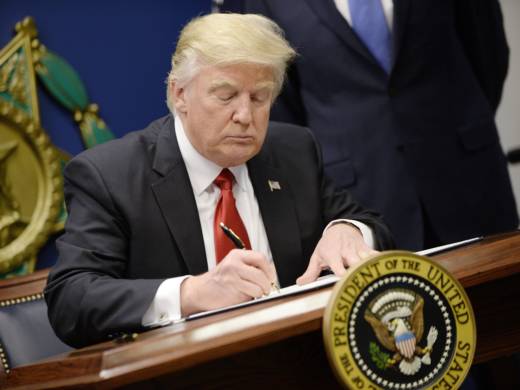"It’s kind of like poisoning of the well by the language and the rhetoric that’s been around it for some time," Boswell said. "Now, will the court look at it as if none of those other things were stated?"
Amplifying Boswell's point, Attorney General Xavier Becerra issued a statement saying he was "carefully reviewing" the new order, adding "no one will or should soon forget the Trump Administration’s multiple, public promises to ban Muslims from the country.”
Washington State Attorney General Bob Ferguson, who filed the original lawsuit that blocked Trump's order, said Monday his office is figuring out its "next legal steps" in light of the new order.
California's elected Democrats quickly denounced the president's action. In a statement, Sen. Dianne Feinstein said the new order "is yet another discriminatory, misguided effort with no basis in fact."
“Painting more than 150 million people with the same broad brush is contrary to the principle of religious freedom and will do nothing to make us safer,” she added. "Just like the first order, we will work to rescind it".
Forty minutes before Feinstein weighed in, Sen. Kamala Harris issued a statement condemning Trump's order, saying it "undermines our nation's core values, jeopardizes national security, and hurts our economy."
Referring to both today's order and President Trump's unfounded accusations over the weekend that President Obama ordered the wiretapping of phones at Trump Tower during the campaign, House Democratic Leader Nancy Pelosi said “the president claims he is strengthening our security, but his administration’s dangerous and incompetent actions are making America less safe, not more.”
But speaking on KQED's Forum this morning, Chapman University law school professor John Eastman said the new executive order, "is on even more solid grounds than the prior one, which I thought was perfectly constitutional."
"It’s clearly not a Muslim ban," Eastman said. "It applies to anyone from these countries, whether they’re Muslim or not, and it doesn’t apply to other majority-Muslim countries around the world where we don’t have issues with terrorism."
In response, Zahra Billoo, executive director of the Council on American-Islamic Relations for San Francisco, said that despite the changes, today's executive order "in our perspective is very much the same, though it removes the chaos and continues the fear."
Billoo said allowing time for the new order to take effect will remove from view the most sympathetic travelers unwittingly caught up in the ban "and that's what resulted in the protests."
Now, she said, "they won't be able to get on planes to come to the United States on March 16."
Billoo also worries that when the ban on visas for travelers from these six countries expires in 90 days, it will be extended "and they might actually add to it."
